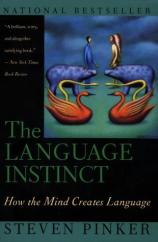About the Book
About the Book
The Language Instinct

Language is at the center of human existence. The activities that fill our days-politics and romance, business and education, entertainment and warfare-require the uniquely human ability to use and understand language. We all have questions about the nature of this ability. How is language mastered and used? Can animals learn it? What about computers? Are some languages better than others? How does the language we learn affect how we think?
In The Language Instinct, Steven Pinker reviews scientific research showing that language is an "instinct," wired into the human brain through the process of biological evolution. Some striking things follow from this.
Language emerges in the young child as the result of the growth of the brain, and its intricate structure is largely encoded in the genes. No instruction or training is required for children to develop a full-blown language-it will appear spontaneously even in the most extreme circumstances.
Just as with the communication systems of other species-such as bee dance and birdsong-the human capacity for language has its own special properties. Contrary to popular belief, attempts to teach sign language to animals such as chimpanzees have not succeeded.
All human languages, signed or spoken, are variants in the same universal system. This system is so complex that there is no existing computer that uses language as well as a three-year-old child. Complaints that some groups of people possess an inferior form of language are based on prejudice, ignorance of grammar, or both.
People who never learn language are still capable of rich and elaborate reasoning, and there is no evidence that speakers of different languages think about the world in different ways. In general, language is separate-in the genes and in the brain-from other instincts that make up the human mind.
The Language Instinct
- Publication Date: August 30, 2012
- Paperback: 496 pages
- Publisher: Perennial
- ISBN-10: 0060976519
- ISBN-13: 9780060976514


